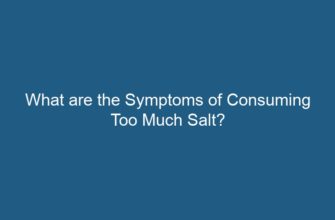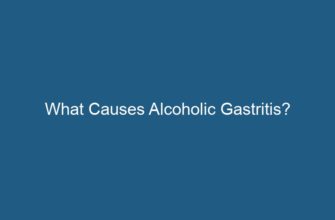Food poisoning, also known as foodborne illness, is a common condition caused by consuming contaminated food or beverages. It occurs when harmful microorganisms, such as bacteria, viruses, parasites, or toxins, contaminate the food we eat. Food poisoning can lead to various side effects, which can range from mild discomfort to severe complications. In this article, we will explore the different subtopics related to the side effects of food poisoning in detail.
- 1. Types of Food Poisoning
- 1.1 Bacterial Food Poisoning
- 1.2 Viral Food Poisoning
- 1.3 Parasitic Food Poisoning
- 2. Common Symptoms of Food Poisoning
- 2.1 Gastrointestinal Symptoms
- 2.2 Flu-Like Symptoms
- 2.3 Dehydration
- 3. Complications of Food Poisoning
- 3.1 Hemolytic Uremic Syndrome (HUS)
- 3.2 Reactive Arthritis
- 3.3 Guillain-Barré Syndrome (GBS)
- 3.4 Chronic Health Issues
- 4. Prevention of Food Poisoning
- 4.1 Safe Food Handling
- 4.2 Safe Food Storage
- 4.3 Safe Water and Beverages
- 4.4 Proper Hygiene
- 5. Frequently Asked Questions (FAQs)
- 5.1 Can food poisoning be fatal?
- 5.2 How long does food poisoning last?
- 5.3 When should I see a doctor for food poisoning?
- 5.4 Can I prevent food poisoning while traveling?
- 5.5 Can food poisoning affect pregnant women?
- 5.6 Is there a cure for food poisoning?
- 6. Conclusion
1. Types of Food Poisoning
Food poisoning can be caused by a variety of factors, and each type may have different side effects:
1.1 Bacterial Food Poisoning
Bacterial food poisoning is one of the most common types. It occurs when food becomes contaminated with bacteria such as Salmonella, E. coli, Campylobacter, or Listeria. The side effects may include:
- Gastrointestinal symptoms like nausea, vomiting, and diarrhea
- Abdominal pain and cramps
- Fever and chills
- Dehydration
1.2 Viral Food Poisoning
Viral food poisoning is caused by viruses like norovirus or rotavirus. The side effects may include:
- Severe vomiting
- Diarrhea
- Fever and body aches
- Headache and fatigue
1.3 Parasitic Food Poisoning
Parasitic food poisoning occurs when parasites, such as Giardia or Cryptosporidium, contaminate food or water. The side effects may include:
- Diarrhea
- Abdominal pain and cramps
- Nausea and vomiting
- Weight loss
2. Common Symptoms of Food Poisoning
Regardless of the specific type of food poisoning, there are some common symptoms that individuals may experience:
2.1 Gastrointestinal Symptoms
Gastrointestinal symptoms are the most common side effects of food poisoning. These may include:
- Nausea and vomiting
- Diarrhea, which can be watery, bloody, or both
- Abdominal pain and cramps
2.2 Flu-Like Symptoms
Some cases of food poisoning may also present flu-like symptoms, including:
- Fever and chills
- Body aches and muscle pain
- Headache
- Fatigue and weakness
2.3 Dehydration
Severe cases of food poisoning can lead to dehydration, which is a potentially serious complication. Symptoms of dehydration may include:
- Dry mouth and throat
- Decreased urine output
- Dizziness and lightheadedness
- Extreme thirst
3. Complications of Food Poisoning
While most cases of food poisoning resolve on their own within a few days, some individuals may experience complications. These can include:
3.1 Hemolytic Uremic Syndrome (HUS)
HUS is a severe complication that can occur after an infection with certain strains of E. coli bacteria. It can cause kidney failure, low platelet count, and anemia.
3.2 Reactive Arthritis
Some individuals may develop reactive arthritis, a condition characterized by joint pain, swelling, and inflammation, after a bacterial infection like Salmonella or Campylobacter.
3.3 Guillain-Barré Syndrome (GBS)
GBS is a rare neurological disorder that can be triggered by certain bacterial or viral infections, including food poisoning. It causes muscle weakness, numbness, and even paralysis.
3.4 Chronic Health Issues
In some cases, food poisoning can lead to long-term health issues, such as irritable bowel syndrome (IBS) or chronic digestive problems.
4. Prevention of Food Poisoning
Preventing food poisoning is crucial to avoid the side effects associated with it. Here are some preventive measures:
4.1 Safe Food Handling
Properly wash hands, surfaces, utensils, and raw foods to prevent cross-contamination. Cook food to appropriate temperatures and refrigerate promptly.
4.2 Safe Food Storage
Store food at the correct temperatures to prevent bacterial growth. Use separate containers for raw and cooked foods to avoid contamination.
4.3 Safe Water and Beverages
Ensure that water and other beverages are safe for consumption. Use clean, potable water for cooking, drinking, and washing fruits and vegetables.
4.4 Proper Hygiene
Maintain good personal hygiene habits, such as washing hands thoroughly before eating or preparing food, and avoiding touching your face or mouth.
5. Frequently Asked Questions (FAQs)
5.1 Can food poisoning be fatal?
While most cases of food poisoning resolve without complications, severe cases can be life-threatening, especially for vulnerable populations such as young children, pregnant women, the elderly, and individuals with weakened immune systems.
5.2 How long does food poisoning last?
The duration of food poisoning varies depending on the type of infection and individual circumstances. In most cases, symptoms resolve within a few days to a week. However, some infections may require medical attention and can last longer.
5.3 When should I see a doctor for food poisoning?
You should consider seeking medical attention if you experience severe symptoms such as persistent vomiting, bloody diarrhea, high fever, signs of dehydration, or if your symptoms do not improve after a few days.
5.4 Can I prevent food poisoning while traveling?
Yes, you can prevent food poisoning while traveling by following safe food handling practices, avoiding street food or uncooked food, and drinking only bottled or properly treated water.
5.5 Can food poisoning affect pregnant women?
Yes, pregnant women are more susceptible to food poisoning due to changes in their immune system. It is important for them to practice safe food handling and avoid high-risk foods to protect both themselves and their unborn baby.
5.6 Is there a cure for food poisoning?
There is no specific cure for food poisoning. Treatment typically focuses on relieving symptoms and preventing complications. It is important to rest, stay hydrated, and follow medical advice if necessary.
6. Conclusion
Food poisoning can have various side effects, ranging from gastrointestinal symptoms to severe complications. Taking preventive measures and practicing safe food handling are essential to reduce the risk of food poisoning. If you experience symptoms of food poisoning, it is important to seek medical attention if necessary. By staying informed and following proper precautions, you can protect yourself and others from the potentially harmful effects of food poisoning.










